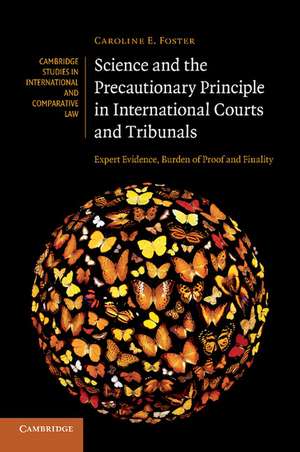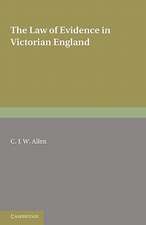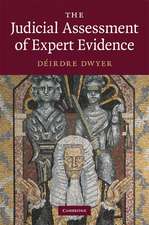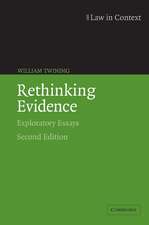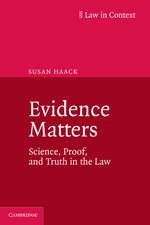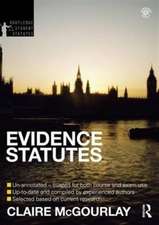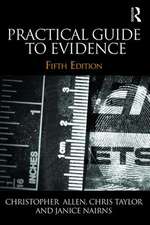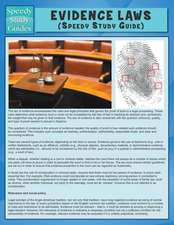Science and the Precautionary Principle in International Courts and Tribunals: Expert Evidence, Burden of Proof and Finality: Cambridge Studies in International and Comparative Law, cartea 79
Autor Caroline E. Fosteren Limba Engleză Paperback – 9 oct 2013
| Toate formatele și edițiile | Preț | Express |
|---|---|---|
| Paperback (1) | 322.51 lei 6-8 săpt. | |
| Cambridge University Press – 9 oct 2013 | 322.51 lei 6-8 săpt. | |
| Hardback (1) | 602.29 lei 6-8 săpt. | |
| Cambridge University Press – 23 mar 2011 | 602.29 lei 6-8 săpt. |
Din seria Cambridge Studies in International and Comparative Law
-
 Preț: 201.40 lei
Preț: 201.40 lei - 9%
 Preț: 731.44 lei
Preț: 731.44 lei -
 Preț: 231.74 lei
Preț: 231.74 lei -
 Preț: 200.34 lei
Preț: 200.34 lei -
 Preț: 231.88 lei
Preț: 231.88 lei -
 Preț: 176.91 lei
Preț: 176.91 lei - 9%
 Preț: 661.95 lei
Preț: 661.95 lei -
 Preț: 233.37 lei
Preț: 233.37 lei -
 Preț: 230.94 lei
Preț: 230.94 lei - 9%
 Preț: 765.91 lei
Preț: 765.91 lei -
 Preț: 237.53 lei
Preț: 237.53 lei - 9%
 Preț: 773.85 lei
Preț: 773.85 lei -
 Preț: 329.28 lei
Preț: 329.28 lei - 14%
 Preț: 793.62 lei
Preț: 793.62 lei -
 Preț: 238.11 lei
Preț: 238.11 lei - 9%
 Preț: 596.72 lei
Preț: 596.72 lei - 9%
 Preț: 593.37 lei
Preț: 593.37 lei -
 Preț: 209.41 lei
Preț: 209.41 lei - 9%
 Preț: 917.66 lei
Preț: 917.66 lei -
 Preț: 239.72 lei
Preț: 239.72 lei - 11%
 Preț: 639.92 lei
Preț: 639.92 lei -
 Preț: 350.03 lei
Preț: 350.03 lei - 14%
 Preț: 784.65 lei
Preț: 784.65 lei -
 Preț: 310.86 lei
Preț: 310.86 lei -
 Preț: 358.28 lei
Preț: 358.28 lei - 14%
 Preț: 698.80 lei
Preț: 698.80 lei - 14%
 Preț: 700.76 lei
Preț: 700.76 lei -
 Preț: 284.78 lei
Preț: 284.78 lei - 14%
 Preț: 896.01 lei
Preț: 896.01 lei -
 Preț: 288.04 lei
Preț: 288.04 lei - 11%
 Preț: 642.00 lei
Preț: 642.00 lei - 14%
 Preț: 731.56 lei
Preț: 731.56 lei - 14%
 Preț: 721.96 lei
Preț: 721.96 lei - 9%
 Preț: 661.91 lei
Preț: 661.91 lei - 14%
 Preț: 757.69 lei
Preț: 757.69 lei - 9%
 Preț: 662.74 lei
Preț: 662.74 lei - 14%
 Preț: 760.17 lei
Preț: 760.17 lei - 14%
 Preț: 703.42 lei
Preț: 703.42 lei -
 Preț: 363.28 lei
Preț: 363.28 lei -
 Preț: 464.33 lei
Preț: 464.33 lei -
 Preț: 324.79 lei
Preț: 324.79 lei - 14%
 Preț: 785.32 lei
Preț: 785.32 lei
Preț: 322.51 lei
Nou
Puncte Express: 484
Preț estimativ în valută:
61.71€ • 64.44$ • 50.96£
61.71€ • 64.44$ • 50.96£
Carte tipărită la comandă
Livrare economică 15-29 aprilie
Preluare comenzi: 021 569.72.76
Specificații
ISBN-13: 9781107669031
ISBN-10: 1107669030
Pagini: 400
Dimensiuni: 152 x 230 x 20 mm
Greutate: 0.53 kg
Editura: Cambridge University Press
Colecția Cambridge University Press
Seria Cambridge Studies in International and Comparative Law
Locul publicării:New York, United States
ISBN-10: 1107669030
Pagini: 400
Dimensiuni: 152 x 230 x 20 mm
Greutate: 0.53 kg
Editura: Cambridge University Press
Colecția Cambridge University Press
Seria Cambridge Studies in International and Comparative Law
Locul publicării:New York, United States
Cuprins
Part I. Context and Theory: 1. Introduction; 2. Cooperation between disputing parties; Part II. Expert Evidence: 3. Methods for taking expert evidence in scientific disputes; 4. The role of adjudicators and the role of experts; Part III. Burden of Proof: 5. Getting to the heart of the rules on burden of proof; 6. Reversing the burden of proof to give effect to the precautionary principle; Part IV. The Finality of Adjudication: 7. Finality, revision and nullity in scientific cases; 8. Reassessment proceedings and res judicata; 9. Conclusion.
Recenzii
'Citation of this book in the ICJ's Pulp Mills decision is testament to the text's importance as a secondary resource for international jurists. The book's discussion on the precautionary principle is enlightening for all legal practitioners. It is notable in this respect that it is also cited in the New Zealand Law Society's submission on the Exclusive Economic Zone and Continental Shelf (Environmental Effects) Bill 2011 (EEZ Bill) … [It] is a timely addition to the existing body of international literature … a welcome addition … given ongoing debate concerning the application of the precautionary principle. It is relevant in this respect to legal practice within both domestic and international jurisdictions.' Robert Makgill and Nicola de Wit, NZ Lawyer
'This meticulously researched book successfully addresses many … challenging questions and provides a number of innovative, yet carefully developed, recommendations for reform. It is scholarly yet highly readable, and carefully balances discussion of the theoretical, technical, contextual and practical … [it] makes a significant contribution to both the literature and, more importantly, to the understanding of the role played by science and scientific experts in international adjudicatory proceedings. As such, it is recommended as essential reading for judges, lawyers working in academia, government and private practice engaged in issues relating to international adjudication as well as to higher-level students. Moreover, scientists regularly engaged in dispute resolution processes and the provision of expert evidence should also read this book in order to understand how their role relates to, and substantively impacts upon, the broader international adjudicatory process.' Karen Scott, Journal of the Royal Society of New Zealand
'[This book] is truly in the spirit of the times. It is a great and unique contribution to the debate on scientific fact-finding by international courts and tribunals … [its] balanced approach … will impassion both academics and practitioners, and … will rank Foster's book among the greatest scholarly contributions ever written on the topic of scientific disputes.' Makane Moïse Mbengue, Review of European Community and International Environmental Law
'… Caroline Foster provides a very informative and enriching book. She devotes herself to a thorough analysis of numerous cases - an analysis that is as impressive as it is useful - including written and oral proceeding materials. But the book is also forward-looking and informs an ongoing debate.' Sandrine Maljean-Dubois, The Law and Practice of International Courts and Tribunals
'Caroline Foster's book constitutes an important addition to the literature on international tribunals and the inter-linkage between science and law in the international domain. The book includes a detailed analysis of the place of scientific evidence in international disputes, the role of adjudicators and experts, and the way in which these issues are influenced by the precautionary principle.' Oren Perez, European Journal of International Law
'… provides a useful insight into into the commonalities and differences between … international adjudicative bodies … makes an ambitious contribution to the literature in drawing together the practice of multiple courts and tribunals and raising awareness of the key problems that scientific complexity and uncertainty pose for international adjudicative procedure.' Christopher A. Thomas, International and Comparative Law Quarterly
'Caroline Foster provides a highly informative account of the role of expert evidence in the peaceful settlement of international disputes where science is challenged, uncertain, or even contestable. The use and application of scientific knowledge by international courts and arbitrators is examined via careful analysis of a wide range of subjects, including fish stock conservation, radioactive pollution of water and air, global warming, coastal erosion, nuclear weapons, release of carcinogens in pulp and paper processing, white asbestos, use of growth hormones in beef production, and the safety of genetically modified organisms in the food chain and biosphere.' Mihalis Kritikos, Transnational Environmental Law
'This meticulously researched book successfully addresses many … challenging questions and provides a number of innovative, yet carefully developed, recommendations for reform. It is scholarly yet highly readable, and carefully balances discussion of the theoretical, technical, contextual and practical … [it] makes a significant contribution to both the literature and, more importantly, to the understanding of the role played by science and scientific experts in international adjudicatory proceedings. As such, it is recommended as essential reading for judges, lawyers working in academia, government and private practice engaged in issues relating to international adjudication as well as to higher-level students. Moreover, scientists regularly engaged in dispute resolution processes and the provision of expert evidence should also read this book in order to understand how their role relates to, and substantively impacts upon, the broader international adjudicatory process.' Karen Scott, Journal of the Royal Society of New Zealand
'[This book] is truly in the spirit of the times. It is a great and unique contribution to the debate on scientific fact-finding by international courts and tribunals … [its] balanced approach … will impassion both academics and practitioners, and … will rank Foster's book among the greatest scholarly contributions ever written on the topic of scientific disputes.' Makane Moïse Mbengue, Review of European Community and International Environmental Law
'… Caroline Foster provides a very informative and enriching book. She devotes herself to a thorough analysis of numerous cases - an analysis that is as impressive as it is useful - including written and oral proceeding materials. But the book is also forward-looking and informs an ongoing debate.' Sandrine Maljean-Dubois, The Law and Practice of International Courts and Tribunals
'Caroline Foster's book constitutes an important addition to the literature on international tribunals and the inter-linkage between science and law in the international domain. The book includes a detailed analysis of the place of scientific evidence in international disputes, the role of adjudicators and experts, and the way in which these issues are influenced by the precautionary principle.' Oren Perez, European Journal of International Law
'… provides a useful insight into into the commonalities and differences between … international adjudicative bodies … makes an ambitious contribution to the literature in drawing together the practice of multiple courts and tribunals and raising awareness of the key problems that scientific complexity and uncertainty pose for international adjudicative procedure.' Christopher A. Thomas, International and Comparative Law Quarterly
'Caroline Foster provides a highly informative account of the role of expert evidence in the peaceful settlement of international disputes where science is challenged, uncertain, or even contestable. The use and application of scientific knowledge by international courts and arbitrators is examined via careful analysis of a wide range of subjects, including fish stock conservation, radioactive pollution of water and air, global warming, coastal erosion, nuclear weapons, release of carcinogens in pulp and paper processing, white asbestos, use of growth hormones in beef production, and the safety of genetically modified organisms in the food chain and biosphere.' Mihalis Kritikos, Transnational Environmental Law
Notă biografică
Descriere
How should uncertainties implicit in scientific evidence be dealt with in international legal disputes relating to health and the environment?
